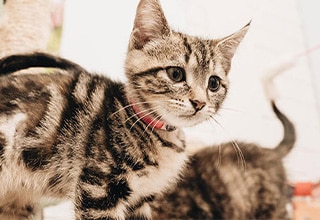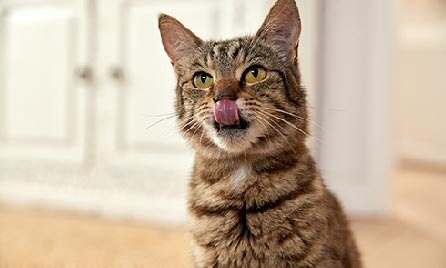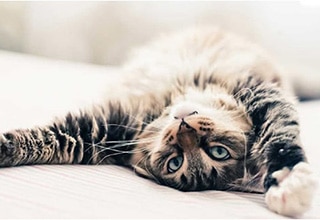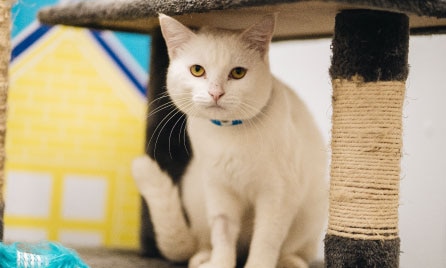- text
-
† Offer available to new Everyday Pet Insurance policyholders, and is limited to 1 membership per eligible policy. The free membership offer (valued at $199p.a) is from the date of your policy commencement, provided your Everyday Pet Insurance policy remains active. You are not eligible to redeem the free membership subscription for cash or credit. VetAssist is a separate subscription based service to the Everyday Pet Insurance product, and is provided independently by Everyday Insurance third party service provider, VetChat Services Pty Ltd (VetChat). Click here for full VetAssist Service terms and conditions. Everyday Insurance reserves the right to vary or remove this offer at any time and will provide reasonable notice of any such changes.
5 Benefits of desexing cats.
VetAssist advocates for desexing of family pets and for responsible breeding. We asked Dr Claire from VetAssist to share some information about desexing cats.
1. Health benefits.
Every cat can benefit from desexing. First and foremost, there are health benefits. Desexing a female cat reduces the likelihood that they will suffer from illness and diseases that are more common in undesexed female cats such as mammary cancer and uterine infection (pyometra).
2. Curb those instincts.
When cats reach adolescence their sex hormones tend to have behavioural effects as well. Cats are more likely to roam - which increases the chance of getting into a fight with another animal, to injury from cars, fences etc and even to getting lost. Females who roam can mate with a partner, which can lead to pregnancy.
Male cats who are not desexed will also develop an increased smell to their urine and tend to spray urine in the house, a trait not well tolerated by even the most ardent cat lovers.
3. Oversupply of cats.
Desexing your cat will prevent unwanted kittens. As well as being an immediate plus for families who don’t want more than they bargained for, this is a simple way in which you can help minimise the many unwanted cats that are given away, abandoned, or put down each year.
4. Longevity.
It has been shown that the lifespan for both male and female desexed cats, is longer than those who are not desexed.1
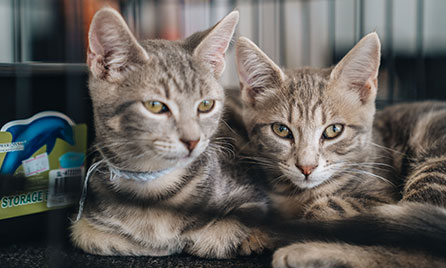
5. Timing.
Most shelters and rescue organisations have desexing performed at a very young age, around 8 weeks of age. This is to ensure they are rehomed after they’re desexed.
In a home environment, you can wait until a slightly later age. Typically Veterinarians recommend desexing male and female cats at around four to six months of age - but as with any health decision for your individual cat, always consult your Veterinarian to decide on the best timing for desexing.
Related articles.
Sources:
1. http://www.banfield.com/Banfield-State-of-Pet-Health-Report_2013.pdf
Not all conditions are covered by Everyday Pet Insurance. Information provided on this page is general information only. Please refer to the Product Disclosure Statement for more information about Everyday Pet Insurance products and the limits and exclusions that might apply.
- text
-
Everyday Pet Insurance policies entered into for the first time prior to 17 July 2023 and subsequent renewals of those policies are issued by The Hollard Insurance Company Pty Ltd ABN 78 090 584 473, AFSL 241436 (Hollard), arranged and administered by PetSure (Australia) Pty Ltd ABN 95 075 949 923, AFSL 420183 (PetSure) and promoted and distributed by Hollard’s Authorised Representative (AR) Woolworths Group Limited ABN 88 000 014 675, AR 245476 (Woolworths).
Everyday Pet Insurance policies entered into for the first time on or after 17 July 2023 and subsequent renewals of those policies are issued by PetSure and promoted and distributed by PetSure’s AR, Woolworths.
Any advice provided is general only and does not take into account your individual objectives, financial situation or needs. Please consider the Product Disclosure Statement (PDS) to ensure this product meets your needs before purchasing, or choosing to continue with the product. PDS and Target Market Determination available at insurance.everyday.com.au/pet-insurance.
